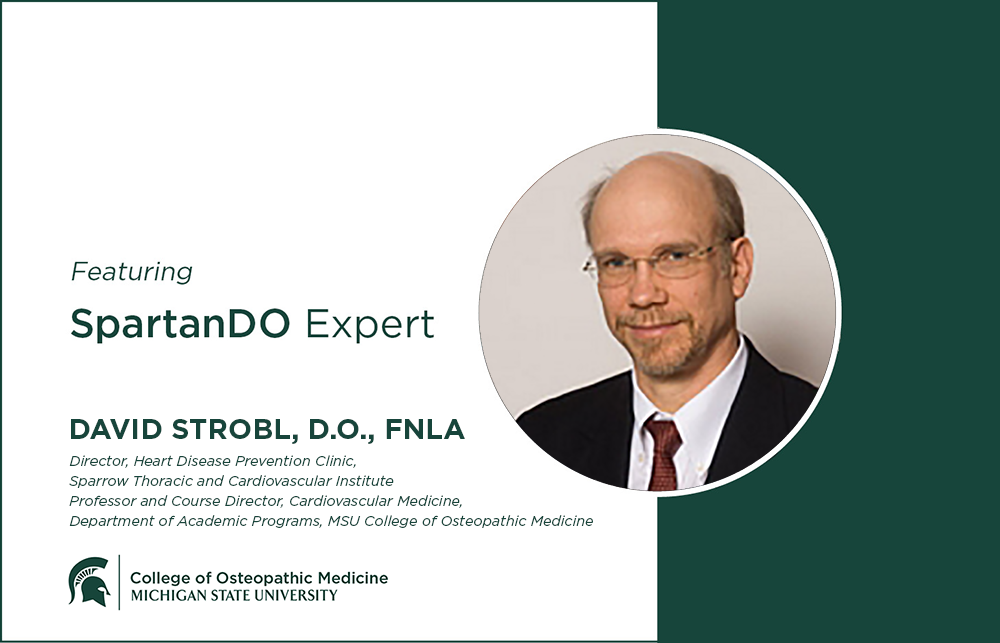SpartanDO Expert Take 2023-02
February 2023
Heart Health Month
Featuring David J. Strobl, D.O., FNLA, Director, Heart Disease Prevention Clinic, Sparrow Thoracic and Cardiovascular Institute, and Professor and Course Director, Cardiovascular Medicine, Department of Academic Programs, MSU College of Osteopathic Medicine.
Dr. Strobl helps us gain an understanding of heart disease, the risks, what we should know, and what we can do.

What Is heart disease?
Heart disease is such a broad topic. There are many disorders, some of which you have control over, and some that you don’t, Dr. Strobl said. Generally, though, he said, the main concern regarding heart health/disease, is the condition of your coronary arteries. There can be a buildup of plaque surrounding your coronary arteries (otherwise known as hardening of the arteries), that can cause serious issues. Progression of this plaque build-up can lead to symptoms, such as chest pain, or result in a sudden cardiac event, such as a heart attack.
What are the main things we should be doing to care for our hearts?
Dr. Strobl spoke strongly of the importance of understanding an individuals’ risk factors, such as smoking. “If I get someone to stop smoking, that will reduce their risk of a heart attack by about 50% over the next five years,” Dr. Strobl said. “Other risk factors for heart disease include high cholesterol, high triglycerides or diabetes (type one and two). Diabetes is widely considered a coronary heart disease risk equivalent.”
Some degree of plaque build-up is almost guaranteed in those with diabetes, which is why it’s critically important to monitor and lower cholesterol levels, triglycerides and blood sugars as quickly as possible. Metabolic syndrome can also be an important risk factor to keep watch of, as “experts consider it to be a foreshadowing that someone may develop clinical diabetes,” Dr. Strobl said. Metabolic syndrome’s risk factors include hypertension (high blood pressure), excess abdominal adiposity, elevated triglycerides, depressed HDL (the good kind of cholesterol) and higher blood sugar.
Many of these risk factors can be genetic, meaning they began manifesting at birth. The sooner risk factors are identified, the sooner patients can begin working with their physician to normalize their levels and lower their risk of enduring a cardiac event.
"The number one red flag is family history."
How common is heart disease?
“Heart disease is very common; it’s the number one killer,” Dr. Strobl said. According to the Center for Disease Control and Prevention (CDC), heart disease has remained the number one killer throughout the recent COVID 19 pandemic and continues to cause more deaths than any type of cancer.
Who is most at risk for heart disease?
Risk factors for heart disease include smoking, high cholesterol, high triglycerides, diabetes, metabolic syndrome, and more, and those who have risk factors are at a higher risk for heart disease. Doctors can use Risk Calculators to help their patients determine their level of risk for the next 10 years. For younger patients who are unlikely to endure heart issues within the next 10 years, doctors can use a Lifetime Cardiac Risk Calculation to see the more long-term risk of a patient.
Within the natural aging process, many of the described risk factors are extremely common. Therefore, annual screenings are needed to uncover any concerning changes.
What’s important for us to know?
“Everyone should know their own numbers, [things like] your total cholesterol and triglyceride level. Knowing these numbers as soon as possible is not only beneficial, but easily accessible, meaning you don’t need a special appointment with a cardiologist,” said Dr. Strobl. He urges everyone to get their Fasting Lipid Profile, General Comprehensive Panel and Hemoglobin A1C. He also recommends (specifically for those who struggle with high blood pressure) patients to get their own blood pressure monitors to use at home. “Some people have what’s called office visit, or white-coat hypertension,” Dr. Strobl said, which means that blood pressures may be higher for some individuals while in the doctor’s office, simply because of nerves. Having a monitor at home means that a patient can then keep a diary of their blood pressure at various days/times, allowing for a more comprehensive collection of numbers.
"The number one red flag is family history,” Dr. Strobl said. It’s important to pay attention to family history, to know what might affect you down the road. Having a family history of heart disease or related risk factors does not guarantee you will or won’t endure the same, but it does give physicians a place to start in plans of prevention.
Dr. Strobl’s research
Dr. Strobl’s sub-specialty is lipidology, a specialty in heart disease prevention. He has worked for about 30 years in research to develop lipid-lowering drugs and has been involved in many of the major trials that have shaped the approach to cholesterol and triglycerides. Dr. Strobl said during his fellowship at the Cleveland Clinic, the average cholesterol level was 300 and now doctors recommend everyone have a cholesterol level of 180-200 or below.
In his most recent research, Dr. Strobl has been studying PCSK9 Inhibitors. These are powerful agents that have proven to lower bad cholesterol (LDL) by 60% or more. The results from the large clinical trial with the PCSK9 Inhibitors have the potential to entirely change the heart disease treatment landscape. In a research study named FOURIER, Dr. Strobl learned that the lower the cholesterol, the better in higher risk patients, particularly those who already have documented plaque in their arteries or have had a heart attack or stroke. The study also demonstrated that there’s no apparent risk in low cholesterol levels, but only benefits. Not everyone needs aggressive cholesterol lowering such as the PCSK9 inhibitors. As guidelines continue to evolve, your doctor can make recommendations on what would be an ideal target for you.
